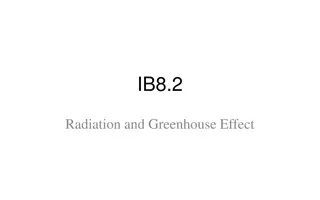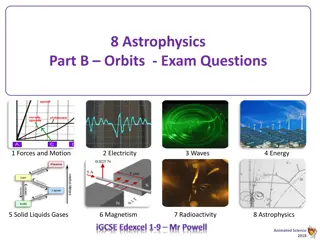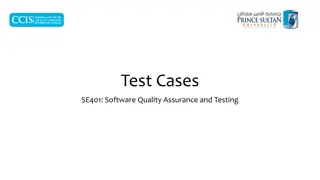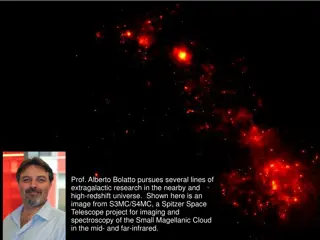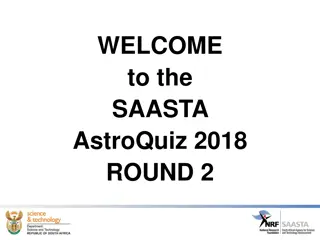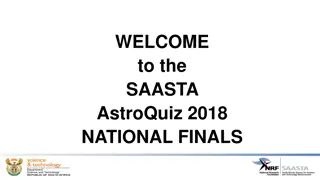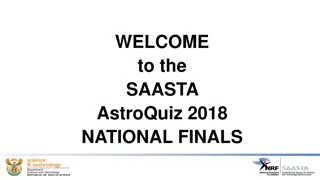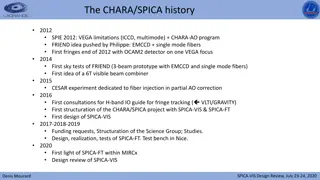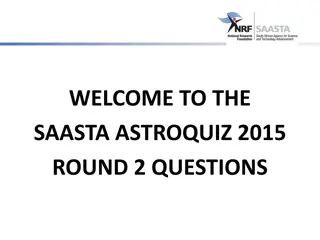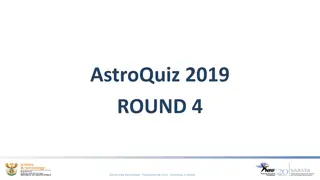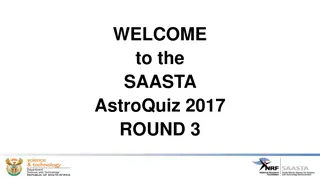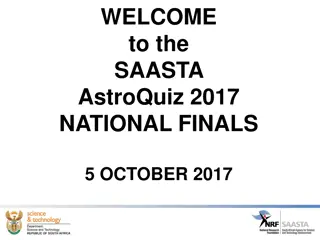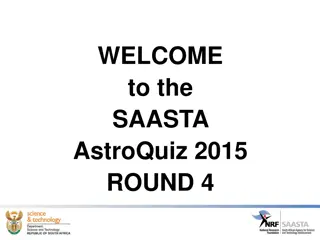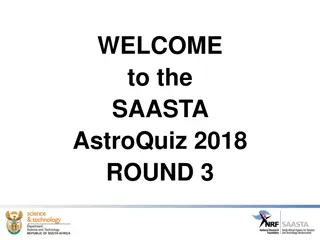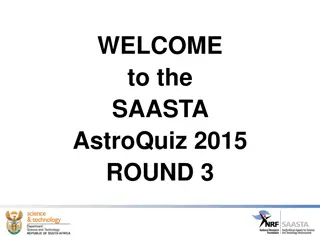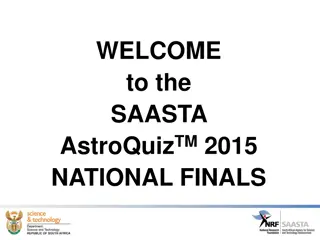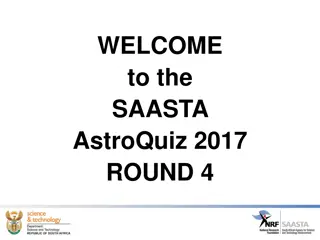SAASTA AstroQuiz 2018 Round 4 - Test Your Astrophysics Knowledge!
Challenge your knowledge of astronomy with these 10 questions from the SAASTA AstroQuiz 2018 Round 4. Test your understanding of telescopes, galaxies, planets, and more in this exciting quiz. Answer questions on various aspects of astronomy, from telescope construction in South Africa to planetary rings and the Milky Way Galaxy. Discover fascinating facts and expand your astronomical knowledge!
Download Presentation

Please find below an Image/Link to download the presentation.
The content on the website is provided AS IS for your information and personal use only. It may not be sold, licensed, or shared on other websites without obtaining consent from the author. Download presentation by click this link. If you encounter any issues during the download, it is possible that the publisher has removed the file from their server.
E N D
Presentation Transcript
WELCOME to the SAASTA AstroQuiz 2018 ROUND 4
QUESTION 1 Which first demonstrator telescope did South Africa build to help with the developments of Square Kilometre Array? A. Kat-7 B. MeerKat C. eXperimental Development Model D. SumbandilaSat
QUESTION 2 What is the diameter of each telescope in the Karoo Array Telescope? A. 24 metres B. 12 metres C. 7 metres D. 15 metres
QUESTION 3 In which province of South Africa can we find the KAT 7? A. Northern Cape B. Eastern Cape C. Gauteng D. Free State
QUESTION 4 Which of the following is not correct about the Southern African Large Telescope (SALT)? A. Comprises of 91 mirrors B. Each mirror is 1,2 metres in diameter C. Mirrors are hexagonal in shape D. It is located in the Western Cape
QUESTION 5 Approximately how far do the rings of Saturn spread/span? A. B. C. D. 280 000 m 380 000 km 282 000 km 190 000 m
QUESTION 6 Which of the following statements is incorrect about the Kuiper belt? A. It is found between Mars & Jupiter B. It is found beyond Neptune C. It is where most dwarf planets are found D. It surrounds our star, the Sun
QUESTION 7 What keep planets in orbit around the Sun and moons in orbit around planets? A. Only gravitation forces B. Only the orbiting speeds C. Gravitation and orbiting speeds D. Only the Sun s attraction
QUESTION 8 The Milky Way Galaxy is best observed from the Southern than Northern hemisphere. A. True B. False
QUESTION 9 The core of the Square Kilometer Array will be situated in the Karoo province. in the North West A. True B. False
QUESTION 10 Radio Astronomy in Southern Africa started in 1961 with the construction of a facility now known as Hartebeesthoek Radio Astronomy Observatory. A. True B. False
QUESTION 11 How many terrestrial planets have natural satellites? A. Five B. One C. Four D. Two
QUESTION 12 Which of the following terrestrial planets have moons around them? A.Earth & Mercury B. Mercury & Venus C. Saturn & Jupiter D.Earth & Mars
QUESTION 13 When the Earth is furthest from the sun, what season is it in the Northern hemisphere? A. Summer B. Winter C. Autumn D. Spring
QUESTION 14 On which day of the year does the summer solstice occur? A. June 21 B. Dec 21 C. June 1 D. Dec 01
QUESTION 15 During an equinox, neither the Southern nor Northern pole is tilted towards the Sun. A. True B. False
QUESTION 16 If the Earth has a radius of 6378 kilometres, what will its circumference (c) be in kilometres? NB: C = 2 r , = 3.14 A. 40053,84 B. 4,0053 x 105 C. 4,0053 x 106 D. 40,0053 x 107
QUESTION 17 The diameter of the Earth is 12 756 km. If a soccer field is 100 m long, how many soccer fields will fit in the Earth s diameter? A. B. C. D. 127,560 12,75600 12756000 12756
QUESTION 18 Which of the following is incorrect about terrestrial planets? A. They are found beyond the asteroid belt B. They have closely spaced orbits compared to Jovian planets C. They are made of mostly rock and metals D. They have higher masses compared to Jovian planets
QUESTION 19 It takes the Earth approximately one year to orbit the Sun. If Lerato is 12 years old, what does this mean in terms of Earth s revolution? A. Lerato has orbited the Sun 12 times B. Since Lerato was born, the Sun shone on her 12 times C. It took Lerato 12 times to orbit the Earth D. The Earth rotated on its axis 12 times with Lerato
QUESTION 20 Which of the following is incorrect about a Lunar eclipse? A. It occurs during Full Moon B. The Earth is between the Sun and the Moon C. The shadow of the Moon falls on the Earth appearing to block out the Sun D. The Moon appears dull
QUESTION 21 Looking into our night sky at the stars outside our Solar System, we are always looking at the past. This is due to __ A. Stars being too bright, colourful and dangerous B. The Earth being smaller than all stars C. Star distances and speed of light D. Stars being stationery whilst Earth travels faster
QUESTION 22 At what phase of the Moon will lunar eclipse occur? A. New Moon B. Full Moon C. First Quarter D. Third Quarter
QUESTION 23 The Innes telescope at the SAASTA Johannesburg Observatory is a refractor telescope. This means that ___ A. The telescope uses a glass lens as the objective B. The telescope uses mirrors as the objective C. The weight of the telescope is 26.5 kg D. The telescope can see as far as distance of 26.5km
QUESTION 24 The Innes telescope at the SAASTA Johannesburg Observatory is a 26.5 inch telescope. The 26.5 inch means that ___ A. The diameter of the telescope s lens is 26,5 inches B. The telescope s height is 26,5 inch C. The weight of the telescope is 26.5 inches D. 4. The telescope can see as far as distance of 26.5km
QUESTION 25 Why is the SKA called Square Kilometre Array ? It is because________ A. The size of all the telescopes together will add up to one square kilometre B. The total surface area of all the antennas will add up to one square kilometre C. The telescopes will be put on a one square kilometre bedrock D. One telescope is one square kilometre in size
QUESTION 26 South Africa's MeerKAT telescope is an SKA precursor or 'pathfinder' telescope. How many dish-shaped antennas will it consist of? A. 64 B. 74 C. 46 D. 47
QUESTION 27 What is the name of the set of telescopes built as an engineering prototype for the MeerKAT? A. KAT-7 B. ASKAP C. SALT D. MeerKat-7
QUESTION 28 What telescope found in the Southern Hemisphere? is the name of the largest optical A. SKA B. SALT C. KAT-7 D. MeerKAT
QUESTION 29 The brightest star in the sky, Sirius, is _____ A. closest to the Earth B. whiter and hotter than the Sun C. blue and hot D. discovered by Robert Innes in 1915
QUESTION 30 On Friday, 15 September 2017, one spacecraft crashed into a certain planet. Mention the name of the spacecraft and the planet it crashed into. A. B. C. D. Soyuz; Earth Opportunity; Mars Cassini; Saturn Voyager 1; Mars
QUESTION 1 A building containing one or more telescopes is referred to as ______ A. An Observatory B. An Astrobuilding C. An Observation House D. A Star Deck
QUESTION 2 What colour is a star when it is cool? A. Blue B. Yellow C. Green D. Orange
QUESTION 3 Which of the following statements about Mars is true? A. It is believed that liquid water once formed rivers and ocean on the surface of Mars millions of years ago. Ice water has been found on Mars surface It is the only planet except Earth to be visited by humans A and B above B. C. D.
QUESTION 4 Which of the following is true? A. Mercury is hotter than Venus because it is nearest to the Sun B. Venus is hotter than Mercury because of the greenhouse effect C. Jupiter is hotter than Mercury because it is the largest planet in the solar system D. None of the above
QUESTION 5 Choose the true statements about Ceres. It is______ i. in the Kuiper Belt. ii. a dwarf planet. iii. in the asteroid belt. iv. the largest comet. The statements that are true, are ______ A. i & ii B. ii & iii C. i & iii D. i & iv
QUESTION 6 Which of the following is not true? A. All planets revolve around the Sun in the same direction B. The tilt of the rotation axis of Uranus is unlike any other planet in the solar system C. Except Mars, all planets revolve around the Sun in the same direction D. A and B above
QUESTION 7 In which South African province do we find the Tswaing crater? A. B. C. D. Eastern Cape Free State North West Limpopo
QUESTION 8 Morokweng, Vredefort, Tswaing and _______ are the impact craters in South Africa. A. SAAO B. Kalkkop C. SALT D. Crater
QUESTION 9 The largest verified and the second oldest crater is: A. Vredefort B. Tswaing C. Kalkkop D. Morokweng
QUESTION 10 What element is abundantly found in the core of planet Earth? A. Oxygen B. Iron C. Nitrogen D. Gold
THANK YOU FOR PARTICIPATING, SEE YOU AT THE NATIONAL FINALS!!


![[PDF⚡READ❤ONLINE] Black Hole Astrophysics: The Engine Paradigm (Springer Praxis](/thumb/21503/pdf-read-online-black-hole-astrophysics-the-engine-paradigm-springer-praxis.jpg)
![[PDF⚡READ❤ONLINE] Cosmology and Particle Astrophysics (Wiley-Praxis Series in As](/thumb/21627/pdf-read-online-cosmology-and-particle-astrophysics-wiley-praxis-series-in-as.jpg)

